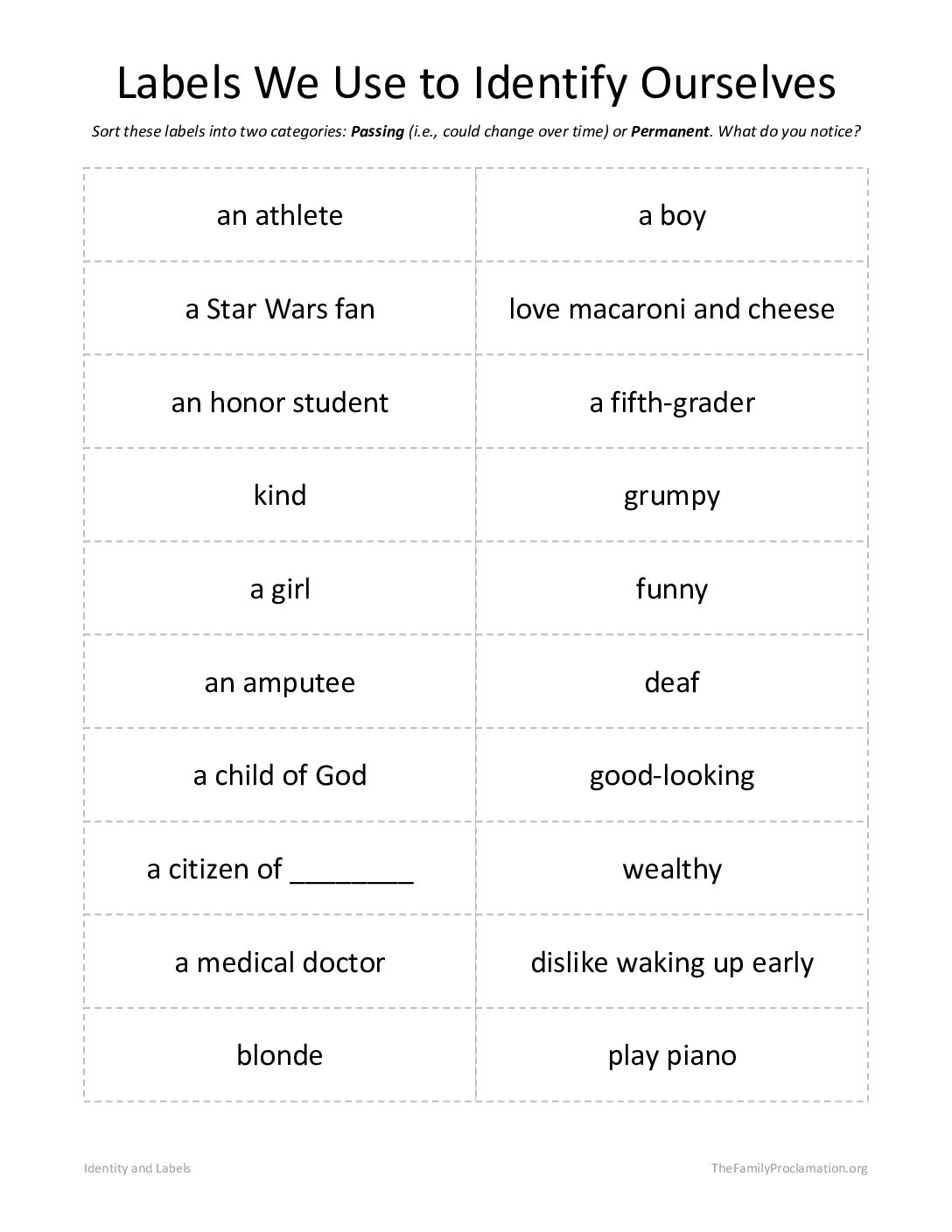Identity and Labels
“All human beings—male and female—are created in the image of God. Each is a beloved spirit son or daughter of heavenly parents, and, as such, each has a divine nature and destiny. Gender is an essential characteristic of individual premortal, mortal, and eternal identity and purpose. In the premortal realm, spirit sons and daughters knew and worshipped God as their Eternal Father and accepted His plan by which His children could obtain a physical body and gain earthly experience to progress toward perfection and ultimately realize their divine destiny as heirs of eternal life. The divine plan of happiness enables family relationships to be perpetuated beyond the grave. Sacred ordinances and covenants available in holy temples make it possible for individuals to return to the presence of God and for families to be united eternally. … We declare the means by which mortal life is created to be divinely appointed. We affirm the sanctity of life and of its importance in God’s eternal plan.
—Paragraphs 2, 3, & 5; The Family: A Proclamation to the World
IDENTITY AND LABELS

Objective
To teach the Family Proclamation, Paragraph 2, 3, 5 as it relates to the important permanent aspects of our identity, such as gender and being a son or daughter of God:
All human beings—male and female—are created in the image of God. Each is a beloved spirit son or daughter of heavenly parents. … Gender is an essential characteristic of individual premortal, mortal, and eternal identity and purpose.
Please note that part two of this lesson teaches about the importance of also recognizing specific passing, or changing, characteristics as part of our identity. They are two sides of the same coin. Both permanent and passing characteristics of our identities are important to understand where we fit in God’s plan.
Introduction
Read Aloud: “What makes you, YOU?” Let’s think about that for a minute. Think about yourself and how you would fill in the blank if I say, “I am (a)______________.” What kinds of words or labels do people use to describe themselves? Maybe you would say, “I am ….” (Consider sharing some of the following examples: a 9th grader, a boy or a girl, a soccer player, an artist, kind, etc.)
Main Activity
Read Aloud: We often give ourselves “labels,” or words that tell something about us. Now we are going to take each of these labels on these slips of paper, and decide together whether they should go in the “Permanent” column or the “Passing” column. “Permanent” means it doesn’t change, ever, no matter what you do, think, or feel. “Passing” means that over time it could change. For example, maybe one day you won’t like basketball as much as you do now, or maybe you’ll grow taller. Let’s take these strips of paper with labels written on them and place them on the board/poster under the category you think they best fit under.
Pass out the slips of paper and move to the board with the two categories listed, “Permanent” and “Passing.” As you read the papers, ask participants to help you place each characteristic/attribute under one of the two categories. Take time to discuss each one and why it is placed in that particular category. Discuss how certain attributes of us are permanent, like gender, while other aspects are passing, like things we feel or like.
Read Aloud: As we watch the following video together called Elephant Trainer, let’s imagine what the elephant was thinking. Think about whether or not we do that with ourselves or others. We will discuss this video near the end of the lesson. (Watch video below.)
Deep Dive
For participants who are older, or ready to discuss “identity” applied to a modern context, consider additional study of paragraph 3 and 5 of The Family: A Proclamation to the World. Discuss ways in which the those teachings apply to identity. Consider also suggesting current social issues that apply to this lesson and the three paragraphs from the proclamation discussed (2,3,5).
Read Aloud: This topic of identity is one of the first lessons we learn when we read the Family Proclamation, attend the temple, or open the scriptures. Nephi tells us immediately who he is and where he comes from (1 Nephi 1:1).

The Spirit of Prayer, by Claudio Roberto Aguiar Ramires
Read Aloud: We can see other ways this important principle is taught in other paragraphs of the Family Proclamation. Can you find them in paragraphs 3 and 5? Can you think of some things that happen in our world that confuse people about this important information Heavenly Father has given us? (Answers might include abortion, gender identity, marriage, etc.)
Assess
Read Aloud: Let’s review what we have learned about labels and ways we identify ourselves, both in our heads and out loud to others. What are some characteristics of labels we should use for ourselves? (Answers may include: Whether a label limits us in spiritual, physical, intellectual, or emotional growth.)

Read Aloud: There are many “identifiers” we use in our lives. Some of them are important and help us function in society. But some can, like we saw with the elephant, can block our ability to progress.
Read Aloud: What was the only reason that the elephants weren’t breaking free and escaping from the camp? (Over time, they adopted the belief that it just wasn’t possible. In effect, the elephants incorrectly labeled themselves as “captive animals.”) In what way do we limit, or chain, (1) ourselves and (2) others, with labels? Can you think of some words that might do that? (Answers may vary.)
Close with something personal about participants or yourself. For example, “One label that means a lot to me is being your mother. That’s something that will never change, and I’m so thankful for that.”
Reflect
Allow participants time to reflect on which permanent labels that are important to Heavenly Father and make them feel closer to him.
Read Aloud: Think to yourself or share out loud, some of the positive and permanent labels we have talked about that make you feel confident, happy, and hopeful about how God sees you.

Testify
Share a quote, proclamation paragraph, or your own personal feelings about the importance of this topic. The following are suggestions of statements you may share with participants:
Read Aloud: Something hopeful that President Dallin H. Oaks tells us that:
Each of us is a child of God. … Every other label, even including occupation, race, physical characteristics, or honors, is temporary or trivial in eternal terms. Don’t choose to label yourselves or think of yourselves in terms that put a limit on a goal for which you might strive.
Dallin H. Oaks, Where Will This Lead?, General Conference, April 2019
Read Aloud: In The Family: A Proclamation to the World, we are reminded of this in several ways. As I read Paragraph 2, think of the positive and permanent ways we are described,
“All human beings—male and female—are created in the image of God. Each is a beloved spirit son or daughter of heavenly parents, and, as such, each has a divine nature and destiny. Gender is an essential characteristic of individual premortal, mortal, and eternal identity and purpose.”
Read Aloud: Even though it can take some work to start thinking this way, one of the best ways to identify ourselves is with permanent labels that matter to Heavenly Father. In part 2 of this lesson, we will discuss identity and how some parts of our identity are not permanent, but instead fit in to the “passing” category.
Close with something personal about participants or yourself. (e.g. One label that means a lot to me is being your mother. That’s something that will never change, and I’m so thankful for that.”)





